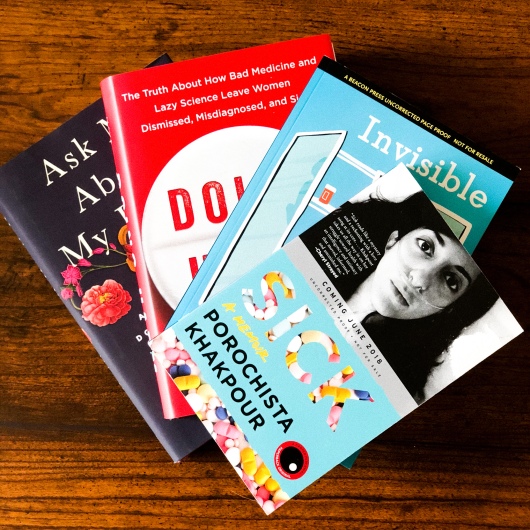By Molly Thibault
Do you know someone who identifies as a woman who also has a chronic illness? Maybe your mother, or your sister, or your friend? Perhaps an aunt or a colleague? What about yourself? Statistically speaking, you answered ‘yes’ at least once because many, though not all, chronic illnesses affect women disproportionately more than men. For instance, three-fourths of the approximately 37 million people with autoimmune disorders in the U.S. are women, 1 in 10 women have endometriosis, and three out of every four people with migraine are women. Despite the fact that so many women experience chronic health conditions, the gender gap in medicine and society at large results in the constant dismissal and mistreatment of women’s pain and illness.
I have been a woman with chronic illness since I was 15. Through high school, college, and now into my twenties, I have learned to navigate spaces and institutions that fail to accept, understand, or accommodate people whose bodies function in an ‘abnormal’ way. This experience has been both emotionally and physically challenging, and has resulted in feelings of isolation and otherness. However, I am grateful to have found understanding and community in a variety of places, including in books.
2018 has brought a diverse selection of narratives written about chronic illness. Four particular books, all works of nonfiction written by women living with chronic illness, provide a variety of perspectives on the dynamic between women, illness, and society. While I sometimes find it difficult to see aspects of my own experiences with illness in the stories of others, I have also found it comforting to read such narratives and know that I am not alone. These stories serve to educate and connect, and I believe it is vital to share them both with those who can relate to them, as well as with those who can learn from them.
If you are interested in a memoir about one young woman’s relentless fight to make doctors believe in her pain, read Ask Me About My Uterus: A Quest to Make Doctors Believe in Women’s Pain by Abby Norman. Norman’s debut delves into her experience of being diagnosed with endometriosis as a student at Sarah Lawrence College and then spending the remainder of her 20s fighting for adequate treatment and understanding despite her worsening health. The story also discusses Norman’s traumatic childhood, for which I would give a content warning for disordered eating and child neglect, which some readers may find upsetting. Both aspects of Norman’s personal story – the physical trauma and the emotional trauma – are complemented by a discussion of the social and historical context of how women and their pain have been dismissed by society and medicine for centuries. Though at times grim, Ask Me About My Uterus is an encouraging and admiral story of strength and resilience.
Another chronic illness memoir is Sick by Porochista Khakpour, which will be released in June 2018. Though I’ve yet to finish this book, what I’ve read thus far has been a beautifully written and painfully honest telling of Khakpour’s experience of life-long illness, which was eventually identified as late-stage Lyme disease. Khakpour discusses the traumas of her past, including fleeing Tehran as a child during the Iranian Revolution, experiencing drug use, sexual assault, and abusive relationships as a college and graduate student, and beginning the long and difficult journey of finally having her severe health problems diagnosed. Though not an easy read, Sick is a raw and eloquent telling of one woman’s attempt to survive in a body that has “never felt at east.”
If you are looking for a book that utilizes personal narrative and social science research to discusses the unique challenges of being a young, chronically ill woman, try Michele Lent Hirsch’s Invisible: How Young Women With Serious Health Issues Navigate Work, Relationships, and the Pressure to Seem Just Fine. In this debut, Lent Hirsch uses narratives of her own and others’ experiences with several medical conditions to open a dialogue about how many ‘typical’ aspects of being a woman are often complicated by life-altering health issues. Though this book is less personal than the previous two memoirs and is informed by sociological research, it remains very accessible to audiences of all kinds. Additionally, this book covers an array of diagnoses, from cancer to HIV to autoimmune disorders and beyond. I am incredibly appreciative of this book and felt both empowered and comforted to see a number of my own experiences and anxieties about being a young woman with chronic illness reflected back at me in the stories Lent Hirsch shares.
Finally, Doing Harm: The Truth About How Bad Medicine and Lazy Science Leave Women Dismissed, Misdiagnosed, and Sick by Maya Dusenbery is perhaps the least personal but most comprehensive and hard-hitting of these four books. Dusenbery examines how gender bias is embedded in every level of modern medicine and healthcare, and how this widespread and festering bias results in the mistreatment and misdiagnosis of women. Whereas the previous books rely heavily on the personal narratives, Dusenbery’s is full of ethnographic, scientific and sociological research. Though dense, this book is groundbreakingly insightful and informative and provides readers – chronically ill and otherwise – a lense through which to understand the treatment of women in modern medicine.
Thank you to Beacon Press, Nation Books, and Harper Perennial for providing copies of Invisible, Ask Me About My Uterus, and Sick for review.
Want to see what else Molly is reading? Make sure to follow her on Instagram @readmollyread! Have you read any books about gender disparity in medicine that you’d like to tell us about leave us a comment below or tag us @littressblog on instagram and twitter or by using the #littressblog!

